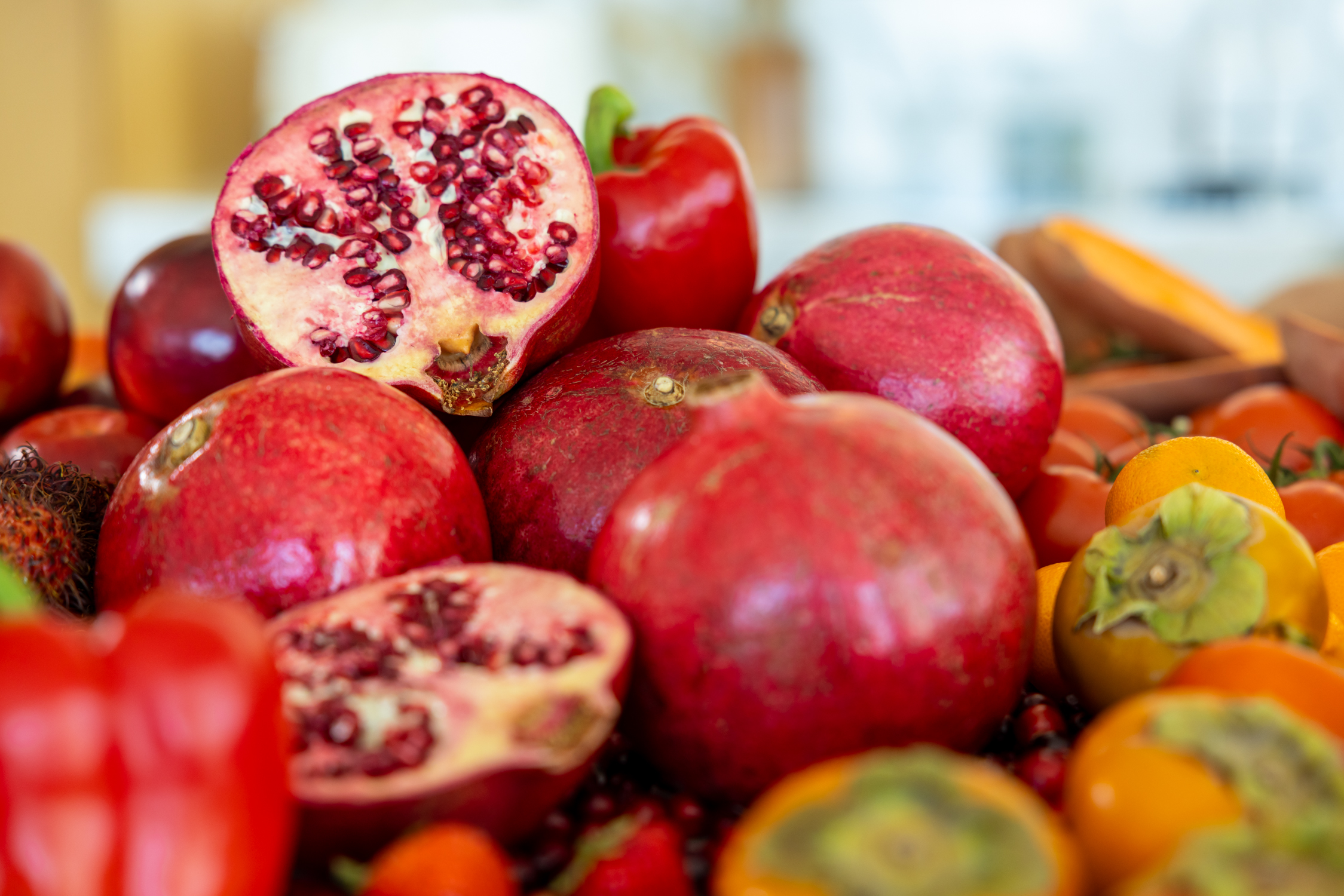How do pomegranates promote healthy aging?
When you are at the grocery store, there are so many familiar foods that are known for their health benefits, which include dietary polyphenols. Foods such as the following:
- Fruits: oranges, apples, grapes, peaches, grapefruit juice, cherries, blueberries, and raspberries
- Vegetables: spinach, onions, shallots, potatoes, black and green olives, globe artichoke heads, broccoli, asparagus, and carrots
- Grains: whole grain wheat, rye, and oat flours
You can also find polyphenols in many spices, seasonings, healthy fats (EVOO), nuts (like pecans), seeds (flax is great!), and legumes (try red or black beans).
But what about the mighty pomegranate?? Pomegranates are creating new buzz for their longevity-promoting properties, curious why? Keep reading to understand how aging well is connected to the polyphenols in pomegranates!
Pomegranates are rich in several types of polyphenols that have potential antioxidant, anti-inflammatory, and anticarcinogenic effects.1 We are also learning that it is not only what is in the pomegranate that is important for healthy aging, but interestingly, how your body uses those ingredients to make longevity-promoting postbiotics. One such postbiotic, derived from the polyphenols in pomegranates, is Urolithin A, which has been shown to have important benefits for healthy aging (more information on Urolithin A is provided below).
What are Polyphenols?
The word “polyphenols” probably sounds familiar when it comes to plant-based superfoods and health, but let’s refresh your memory on what they are. Polyphenols are a type of phytochemical. They are the real workhorses when it comes to giving plants their health-promoting powers.2 You can find them in a wide variety of plant-source foods such as fruits, vegetables, whole grains and tea.3
The Pomegranate’s Longevity Secret
Recent studies have unlocked one of the key healthy-aging secrets of pomegranates. Consumption of the polyphenols in pomegranates leads to the production of a longevity-promoting compound called Urolithin A in the gut. Urolithin A has been shown to trigger a well established anti-aging process called mitophagy – your body’s natural defense against the breakdown of your mitochondria.
When we focus on nutrition to promote good health, we rely on healthy mitochondria. It is the mitochondria that transform the food we eat into the energy our body uses to thrive! Over time, our mitochondria become damaged, and mitophagy is how our body identifies damaged mitochondria and replaces them with fresh new ones, promoting healthy aging. Unfortunately, the mitophagy process slows down over time. This is where Urolithin A comes in, stimulating mitophagy and enabling your body to better use the food we eat.
Urolithin A is a postbiotic. Postbiotics are not present in the food we eat, rather the food we eat provides the ingredients the body needs to make postbiotics. Specifically, the ellagitannins in pomegranate peels are the ingredients the microbes (probiotics) in your gut can convert into Urolithin A. So how do we get enough ellagitannins to make Urolithin A?
Pomegranate Fruit or Pomegranate Juice?
The pomegranate fruit includes the pink seeds called arils, the pith that surrounds the seeds, and the peel. Polyphenols, including anthocyanins and flavonols, are found in the commonly eaten portions of the pomegranate fruit.4 The peel, which as mentioned above, is particularly rich in ellagitannins, but can be quite bitter, making it more difficult to incorporate into your diet. This has led some to use pomegranate juice as an alternative, however, it is important to understand the tradeoff being made. Pomegranate juice is also rich in polyphenols, but the peel of the fruit has been found to have higher total phenolic activity, the good stuff driving health benefits.5
The polyphenols identified in pomegranate juice include tannins, anthocyanins, and ellagic acid derivatives.6 However, the amount of polyphenols present in pomegranate juice can vary greatly. A study done with different types of pomegranate grown in Florida showed that polyphenolic content in the fruit juice ranged widely, with one variety delivering nearly 4x more active nutrients.5 Getting a consistent level of nutrients with a juice can be quite difficult, and the high sugar levels are also not ideal.
In addition, studies show that most of us don’t have the right microbes to make Urolithin A from our diet. That means that regardless of how many pomegranates we eat, or how much pomegranate juice we drink, most of us do not have the right gut microbes to make Urolithin A in the amounts needed to support longevity.
Given this, I have found that supplementation is another option. Mitopure by Timeline Nutrition is a highly pure Urolithin A supplement created to deliver a therapeutic dose of this anti-aging compound in every serving. This product delivers six times the amount of Urolithin A provided by diet alone and shows promise in terms of promoting longevity and health! If you want to try their products, use code “Serena” to receive a 10% discount off any Mitopure plan.
in conclusion…
Pomegranates are rich in polyphenols, which provide many health benefits. One of the important benefits of consuming pomegranates is the production of Urolithin A in the gut, a key compound in promoting healthy aging through the process of mitophagy. And let’s not forget about the benefits of the pomegranates seeds. For most of us, consistently consuming a significant quantity of pomegranates or pomegranate juice daily is very difficult, and our ability to produce Urolithin A in our gut is also uncertain. This being said, it may make sense to find a high quality Urolithin A supplement to enjoy its longevity benefits.
References
- Zarfeshany A, Asgary S, Javanmard SH. Potent health effects of pomegranate. Advanced biomedical research. 2014;3.
- Prakash B, editor. Functional and Preservative Properties of Phytochemicals. Academic Press; 2020 Feb 15.
- Dillard CJ, German JB. Phytochemicals: nutraceuticals and human health. Journal of the Science of Food and Agriculture. 2000 Sep 15;80(12):1744-56.
- Faria A, Calhau C. The bioactivity of pomegranate: impact on health and disease. Critical reviews in food science and nutrition. 2011 Aug 1;51(7):626-34.
- Shahkoomahally S, Khadivi A, Brecht JK, Sarkhosh A. Chemical and physical attributes of fruit juice and peel of pomegranate genotypes grown in Florida, USA. Food Chemistry. 2021 Apr 16;342:128302.
- Gil MI, Tomás-Barberán FA, Hess-Pierce B, Holcroft DM, Kader AA. Antioxidant activity of pomegranate juice and its relationship with phenolic composition and processing. Journal of Agricultural and Food chemistry. 2000 Oct 16;48(10):4581-9.
by





